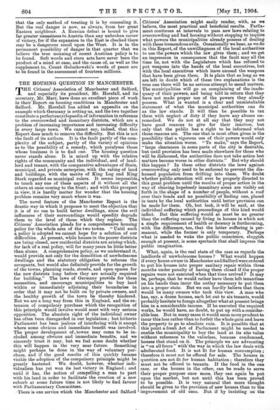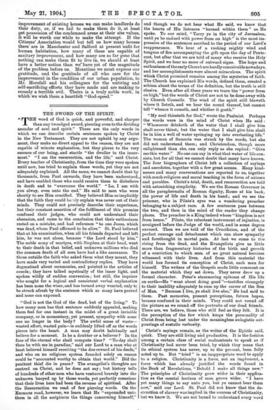T HE Citizens' Association of Manchester and Salford, and especially its
president, Mr. Horsfall, and its secretary, Mr. Marr, have done an excellent piece of work in their Report on housing conditions in Manchester and Salford. Mr. Horsfall has added an appendix on the example which Germany is setting us, and the two together constitute a perfectencyclopaedia of information in reference to the overcrowded and insanitary districts, which are a problem of increasing importance and increasing difficulty in every large town. We cannot say, indeed, that this Report does much to remove the difficulty. But this is not the fault of its authors. It is the fault partly of the com- plexity of the subject, partly of the variety of opinions as to the possibility of a remedy, which paralyses those whose business it is to find one. The housing question never stands alone. It is mixed up with the relative rights of the community and the individual, and of land- lord and tenant, with the comparative advantages of State, municipal, and private enterprise, with the rating of land and buildings, with the merits of King Log and King Stork regarded as municipal rulers. It seems impossible, to touch any one of these aspects of it without all the others at once coming to the front ; and with this prospect in view, it is hardly matter for wonder that the housing problem remains very much where it was.
The novel feature of the Manchester Report is the drastic way in which it proposes to meet the objection that it is of no use to build better dwellings, since the evil influences of their surroundings would speedily degrade them to the level of those which they replace. The Citizens' Association pleads for a comprehensive housing policy for the whole area of the two towns. "Until such a policy is adopted we cannot hope for a solution of our difficulties. At present, while houses in the poorer districts are being closed, new residential districts are arising which, for lack of a real policy, will for many years be little better than slums. A comprehensive policy, as we understand it, would provide not only for the demolition of unwholesome dwellings and the statutory obligation to rehouse the occupants, but would also definitely provide for the growth of the towns, planning roads, streets, and open spaces for the new districts long before they are actually required for building." The laws of Germany provide for these necessities, and encourage municipalities to buy land within or immediately adjoining their boundaries in order that it may not be built on by private owners, and the healthy growth of the town be thereby hindered. But we are a long way from this in England, and the ex- tension of compulsory purchase which the recognition of this principle would involve would meet with very serious opposition. The absolute right of the individual owner has often been disregarded in our legislation ; but hitherto Parliament has been jealous of interfering with it except where some obvious and immediate benefit was involved. The 'proper development of towns may come to be in- cluded among obvious and immediate benefits, and we sincerely trust it may, but we feel some doubt whether this will happen in the very near future. Something might perhaps be done in the way of voluntary pur- chase, and if the good results of this quickly became visible the adoption of the compulsory principle might be greatly hastened. We doubt, however, whether indi- vidualism has yet won its last victory in England ; and until it has, the notion of compelling a man to part with his land in order to facilitate the creation of a new suburb at some future time is not likely to find favour with Parliamentary Committees.
There is one service which the Manchester and Salford Citizens' Association might easily render, with, as we believe, the most practical and beneficial results. Parlia- ment continues at intervals to pass new laws relating to overcrowding and bad housing without stopping to inquire what powers the municipalities already possess of dealing with these tremendous evils. Occasionally we hear, as we do in this Report, of the unwillingness of the local authorities to use the powers which the law gives them ; and we get an impression in consequence that the fault may all the time lie, not with the Legislature which has refused to put weapons into the hands of the local executives, but with the local executives which leave unused the weapons that have been given them. It is plain that so long as we are left in doubt which of these two explanations is the true one there will be no serious attempt to mend matters. The municipalities will go on complaining of the inade- quacy of their powers, and being told in return that they have not made proper use of the powers they already possess. What is wanted is a clear and unmistakable statement of what the municipal authorities can do as the law stands. It will then be possible to tax them with neglect of duty if they leave any abuses un- remedied. We do not at all say that they may not have good reasons to give for their inaction, but only that the public has a right to be informed what those reasons are. The one that is most often given is the possibility that a vigorous use of their powers would only make the situation worse. "To make, says the Report, "large clearances in some parts of the city is desirable, but until provision has been made elsewhere for those who will be dishoused, the authorities dare not take action lest matters become worse in other districts." But why should this happen ? In these other districts the laws against overcrowding only need to be enforced to prevent the dis- housed population from drifting into them. We doubt whether public attention will ever be properly directed to this great problem until the results of proper action in the way of clearing hopelessly insanitary areas are visibly set forth in the shape of a number of people, without a roof over their heads and no possibility of finding one, placed in tents by the local authorities until better provision can be made for them. Oh, but look, it will be said, at the individual suffering which proceedings if this kind would inflict. But this suffering would at most be no greater than the suffering caused by living in houses in which not a single requirement of health or decency is forthcoming, with the difference, too, that the latter suffering is per- manent, while the former is only temporary. Perhaps what is needed to wake the public conscience, sluggish enough at present, is some spectacle that shall impress the public imagination.
What, again, is the real state of the case as regards the landlords of unwholesome houses ? What would happen if every house-owner in Manchester and Salford were ordered to put his houses into proper sanitary repair within three months under penalty of having them closed if the proper repairs were not executed when that time arrived ? It may be, perhaps, that he would rather have them left tenantless on his hands than incur the outlay necessary to put them into a proper state. But we can hardly believe that there would be many owners who took this view. A man who has, say, a dozen houses, each let out to six tenants, would probably hesitate to forego altogether what at present brings him in. a considerable income. If he executed the required works, he would. have, no doubt, to put up with a consider- able loss. But in many cases it would seem more prudent to incur this loss rather than to forfeit the whole gain and leave the property to go to absolute ruin. It is possible that at this point a fresh Act of Parliament might be needed to enable the municipality to buy the land at its site value without reference to the valueless, because condemned, houses that stand on it. The principle we are advocating is "on all fours" with'the way in which the law deals with adulterated food. It is not fit for human consumption ; therefore it must not be offered for sale. The houses in question are not fit for human habitation ; therefore they must not be offered to tenants. If the food in the one case, or the houses in the other, can be made to serve their proper purpose once more, they can again be put upon the market, but not until this has been proved to be possible. It is very natural that more thought should be given to the provision of new houses than to the improvement of old ones. But if by insisting on the
improvement of existing houses we can make landlords do their duty, or, if we fail to make them do it, at least get possession of the condemned areas at their site values, it will be worth our while to make the attempt. If the Citizens' Association would but tell us how many houses there are in Manchester and Salford at present unfit for human habitation, how many of these are capable of sanitary improvement, and how many are so far gone that nothing can make them fit to live in, we should at least have a better notion than we have yet of the magnitude of the problem before us. Meantime we must express our gratitude, and the gratitude of all who care for the improvement in the condition of our urban population, to Mr. Horsfall and his colleagues for the untiring and self-sacrificing efforts they have made and are making to remedy a terrible evil. Theirs is a truly noble work, in which we wish them a heartfelt "God-speed."



































 Previous page
Previous page